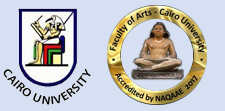عنوان المقال عربي
النظام الإداري في سلطنة المماليک بين المثالية والتنفيذ
Document Type
Original Study
Abstract English
Abstract The Islamic civilization which established from East India to the Eastern coasts of the Atlantic Ocean have helped the Mamluk Sultanate to have a distinguished administrative system. Besides, on the other hand, the Arabic principles and the Islamic ethics had great effects in fortifying that system to work efficiently in all Mamluk provinces for more than two and a half centuries. Therefore, the administrative departments: the legal, the economic, the social and the military situated in the big cities and important provinces. Consequently, the Sultan decrees distributed among the legislative, executive and judicial powers. Thus, the administrative structure looked ideal but in practice things were -sometimes- different as some negative phenomena started to appear such as bribery to get high offices, severe punishments for insincere officials and administrators, accusations on mere suspicion and even buying more than one office in the same time. Accordingly, those negative phenomena and unjust acts caused great harm to human rights and job duties. The Sultan reforms were many but a few of them were achieved because of different circumstances. Though the sincere intentions of the Sultans to preserve the welfare of the state, to maintain the public order and to apply the enforcement of law gave the administrative system in Mamluk Sultanate stability and continuation in Egypt ,Syria and Hijaz for a long period.
الملخص العربي
إن وجود حضارة إسلامية عريقة إمتدت من شرق الهند الى السواحل الشرقية للمحيط الأطلسي هيأت ظهور نظام إداري متميز في سلطنة المماليک ، کما ساعدت المبادئ العربية والإسلامية على خلق دعم قوي ساعد على شمولية هذا النظام واستمراره . وعلى ذلک ظهرت الدواوين الإدارية القانونية والإقتصادية والإجتماعية والعسکرية في مختلف أقاليم سلطنة المماليک. کما تنوعت المراسيم السلطانية والديوانية العامة حتى شملت جميع مظاهر الحياة الإدارية سواء التشريعية أو التنفيذية أو القضائية . وبدا الوضع الإداري متميزًا في صياغته الهيکلية ولکن تطبيق ذلک على مر الزمن لم يکن مثاليًا حيث ظهرت بعض السلبيات في ممارسات بعض الإداريين مثل البذل لتولي المناصب القيادية ، وعقوبات الإخلال الوظيفي ، والإتهامات بالشبهة ، وشراء المناصب والجمع بينها ، وتأرجح التعيينات ، وسوء إختيار کبار الإداريين لأمر أو لأخر حيث ترتب على کل ذلک الإخلال بالواجبات الإدارية والتهاون في حقوق الناس. وکانت القرارات السلطانية للإصلاح تتأرجح في بعض الأحيان بين کمال التنفيذ والإهمال غير المقصود ، ومع ذلک فإن التصنيف الإداري الدقيق ، وکفاءة بعض کبار الإداريين ، وحرص السلطان المملوکي على مصلحة الدولة ، ودقة الترتيب الإداري الوظيفي هيأ لهذا النظام الإستقرار والإستمرار والبروز کظاهرة متميزة في حضارة سلطنة المماليک في مصر والشام والحجاز.
Recommended Citation
Al-Hajji, The life of Nasser
(2022)
"The administrative system in Mamluk Sultanate between idealism and performance,"
Journal of the Faculty of Arts (JFA): Vol. 82:
Iss.
2, Article 11.
DOI: https://doi.org/10.21608/jarts.2022.229020
Digital Object Identifier (DOI)
10.21608/jarts.2022.229020
Accept Date
2022-04-04
Publication Date
4-1-2022

